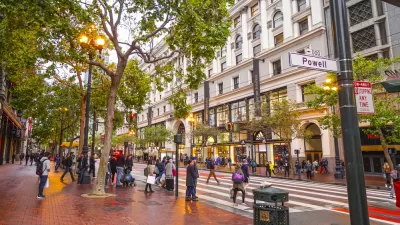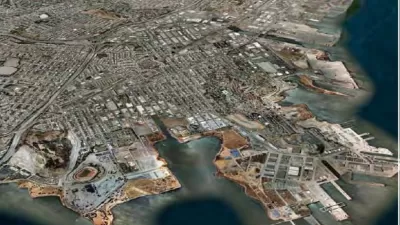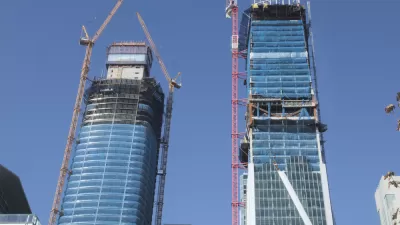With redevelopment funding no longer an option, South San Francisco and other cities increasingly are looking to a community benefits platform, according to Murtaza Baxamusa, a planner and urban planning professor.
The demise of redevelopment has forced cash-strapped cites statewide to come up with more innovative ways to fund projects, with one such strategy involves granting development rights to developers in exchange for providing or funding public benefits.
A fine example of this is South San Francisco, which went through a two-year planning process to come up with a 20-year development plan for downtown that propose 2,400 residential units and 800,000 square feet of commercial and retail space within walking distance of the CalTrain station, writes Murtaza Baxamusa, a planner who develops affordable housing for the San Diego Building Trades Family Housing Corporation and teaches urban planning at the University of Southern California.
Labor, environmental, health, transportation, social justice, and housing organizations in the community came together to give input in the plan, which the South San Francisco City Council adopted earlier this year. While the community benefits approach to planning can be a tough sell in some communities, it’s one that has tremendous value, according to Baxamusa.
”Public accountability for public resources seems like common sense, but is often under attack. This is because a community benefits approach threatens the dominant paradigm in many cities: that of value-free growth (i.e. any development is good). However, a conditional acceptance of growth is not anti-growth, but an affirmation of value-added growth (i.e. any development ought to be good). It expresses astute stewardship of public resources by an educated public that recognizes the economic trade-offs between growth and stagnation, externalization and internalization of costs and benefits, and rent-seeking landlords.”
Other cities are taking notice. Redwood City, San Diego, Menlo Park, and Berkeley all have a growing community benefits movement, he writes.
FULL STORY: How Communities can Benefit from Private Development in California

Alabama: Trump Terminates Settlements for Black Communities Harmed By Raw Sewage
Trump deemed the landmark civil rights agreement “illegal DEI and environmental justice policy.”

Planetizen Federal Action Tracker
A weekly monitor of how Trump’s orders and actions are impacting planners and planning in America.

The 120 Year Old Tiny Home Villages That Sheltered San Francisco’s Earthquake Refugees
More than a century ago, San Francisco mobilized to house thousands of residents displaced by the 1906 earthquake. Could their strategy offer a model for the present?

Opinion: California’s SB 79 Would Improve Housing Affordability and Transit Access
A proposed bill would legalize transit-oriented development statewide.

Record Temperatures Prompt Push for Environmental Justice Bills
Nevada legislators are proposing laws that would mandate heat mitigation measures to protect residents from the impacts of extreme heat.

Downtown Pittsburgh Set to Gain 1,300 New Housing Units
Pittsburgh’s office buildings, many of which date back to the early 20th century, are prime candidates for conversion to housing.
Urban Design for Planners 1: Software Tools
This six-course series explores essential urban design concepts using open source software and equips planners with the tools they need to participate fully in the urban design process.
Planning for Universal Design
Learn the tools for implementing Universal Design in planning regulations.
Clanton & Associates, Inc.
Jessamine County Fiscal Court
Institute for Housing and Urban Development Studies (IHS)
City of Grandview
Harvard GSD Executive Education
Toledo-Lucas County Plan Commissions
Salt Lake City
NYU Wagner Graduate School of Public Service





























